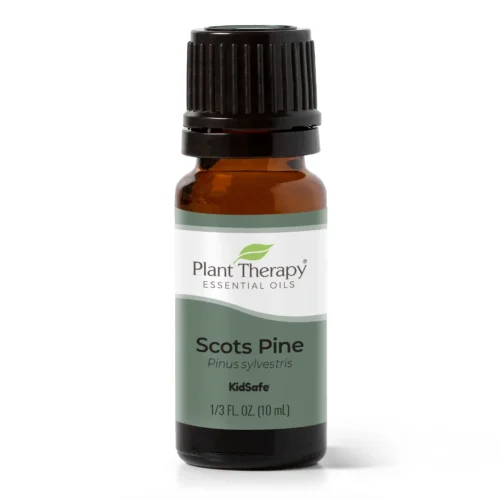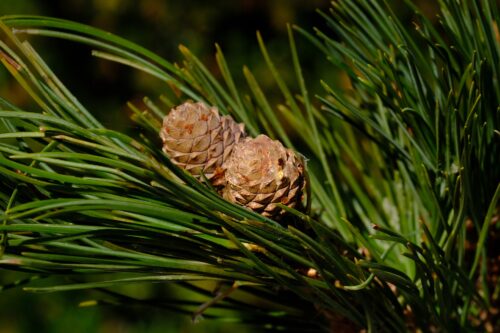
Pine Needle Oil (Pinus sylvestris)
Pine needle oil is steam distilled from the fresh needles, branch tips, or the combined fresh branches with needles and branch tips of Pinus sylvestris L. (Scots pine or Norway pine) or other essential oil-containing species of Pinus. Scots pine is an evergreen conifer tree native to Eurasia, introduced to North America by European settlers, now cultivated extensively in the eastern United States and Canada.
In Germany, pine needle oil is official in the German Pharmacopoeia, the Standard Licenses for Finished Drugs Monographs, and it is also approved by Commission E. Drops of the essential oil are added to boiling water for inhalation of steam vapor as a supportive treatment for catarrhal diseases of the respiratory tract. The drops are also applied topically by carefully rubbing into the skin for rheumatic complaints. The Germans also prepare an aqueous infusion of pine shoots for oral ingestion for the same indications as the oil.

Chemistry and Pharmacology
Constituents include 5097% monoterpene hydrocarbons, such as a-pinene, with lesser amounts of 3-carene, dipentene, b-pinen, D–limonene, a-terpinene, g-terpinene, cis-b-ocimene, myrcene, camphene, sabinene, and terpinolene. Other constituents include bornyl acetate, borneol, 1,8-cineole, citral terpineol, T-cadinol, T-muurolol, a-cadinol, cayophyllene, chamazulen, butyric acid, valeric acid, caproic acid, and isocaproic acid.
The Commission E reported secretolytic, hyperemic, and slight antiseptic activity. The active principles of some pine needle essential oils responsible for the antiviral and antibacterial activities are thought to be limonene, dipentene, and bornyl acetate. Pine needle oil can cause a decongestant effect by stimulating reflex vasoconstriction.
The Commission E approved pine needle oil for catarrhal diseases of the respiratory tract, and externally only for rheumatic and neuralgic ailments. It has been used as a fragrance and flavor component in cough and cold medicines, vaporizer fluids, nasal decongestants, and analgesic ointments.

Benefits
The health benefits of pine essential oil include its ability to reduce inflammation and associated redness, protect against sinus infections, clear mucus and phlegm, treat skin conditions like eczema and psoriasis, boost the immune system, fight fungal and viral infections, stimulate the mind and body, and protect your home and body from a variety of germs.
Pine essential oil also increases metabolism and boosts your activity levels. It is also helpful in purifying the body due to its ability to treat intestinal problems. It is diuretic in nature and helps remove excess water from your body through urination. By stimulating the frequency and quantity of urine, you eliminate more uric acid, excess water, salt, and fat from your body. It also keeps the kidneys healthy, because they do not have to filter the toxins more than once.
Pine essential oil is considered an analgesic and is, therefore, a good remedy for people suffering from joint pain, arthritis, and rheumatic conditions. Besides being an analgesic, it is also an anti-inflammatory agent, meaning that it reduces inflammation and redness of the affected areas, simultaneously eliminating the pain.
The ability of pine essential oil to neutralize free radicals through its antioxidant capacity also represents a positive impact on eye health. Macular degeneration, cataracts, and several other vision-related conditions are due to the presence of free radicals in our system that cause degradation of our cells. Pine essential oil has related to improving eye health and protecting them from natural, age-related failure.
Pine essential oil is an antiseptic used to treat boils, cuts, sports injuries, and Athletes’ Foot. This is not only due to its antiseptic properties, but also its anti-fungal characteristics. Fungal infections are some of the most dangerous and difficult conditions to treat, and if they become internal, they can even be fatal. Therefore, using pine essential oil to cleanse your system of any fungal infections is a good idea.
Pine essential oil is helpful for curing respiratory problems and is commonly used as a remedy for cold and cough. This is due to its abilities as an expectorant, meaning that it loosens phlegm and mucus from the respiratory tracts and makes it easier to eliminate them. By reducing the amount of deposition in your respiratory tracts, your body can fight the initial infection faster and reduce your recovery time.

Using Pine Needle Oil
Pine oil blends well with many other essential oils depending on what you are using it for. Try combining it with oils including bergamot, cedarwood, clary sage, cypress, eucalyptus, frankincense, grapefruit essential oil, juniper, lavender oil, sage, sandalwood, tea tree and thyme.
Aromatically: You can use pine essential oil (or pine nut oil) for aromatherapy by diffusing it within your home using a diffuser. Adding some to firewood is a great way to create a scented fireplace that will travel throughout your home. Another good option is to inhale the oil directly from the bottle when symptoms strike.
Topically: The oil should be diluted with a carrier oil like coconut oil in a 1:1 ratio before applying it directly to your skin. Note that some people react to pine oil by experiencing skin irritation, so perform a patch test first to be safe.
Interactions and Concerns of Pine Oil
Internal consumption of pine essential oil can be dangerous because there is a possibility of kidney damage. It should also not be given to people who are suffering from kidney disorders. Furthermore, pine essential oil can cause irritation to sensitive skin, so it must be used only in a diluted form. Children and elderly people should not be given pine essential oil as it may cause hypertension and irritation.
Some people with sensitive skin or even allergies might experience redness, itching or other skin irritation when using pine nut oil. So as with all essential oils, it is a good idea to first perform a small patch test to make sure you do not experience side effects. Apply one to two drops with a carrier oil to a part of your skin that is not overly sensitive, such as your feet or forearm, and wait for your reaction before beginning to use pine oil on your face, chest or other sensitive areas.
Always combine pine oil with a carrier oil, and never use them undiluted directly on your skin. Keep pine oil away from your eyes or inside of your nose, where it can encounter mucus membranes that can easily become irritated.
Remember that, as with all essential oils, you should never ingest pine needle oil.
Re






